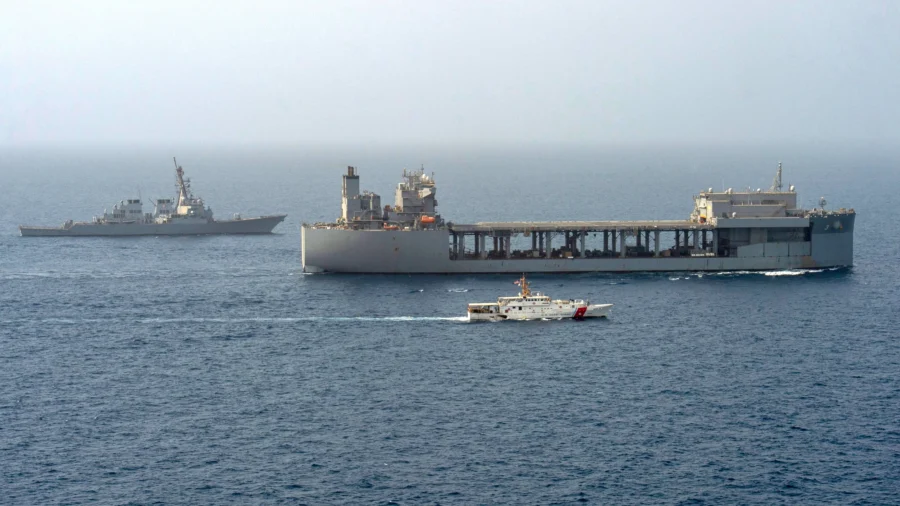Houthi terrorists announced an attack on a U.S. navy ship on Monday, yet damage was not confirmed by the U.S. side.
Houthi military spokesperson Brig. Gen. Yahya Saree claimed the group fired a missile at the USS Lewis B. Puller in the Gulf of Aden, off the south coast of Yemen.
The Puller, which serves as a floating landing base, had been earlier stationed in the Arabian Sea as part of American efforts to curtail Houthi attacks on commercial shipping through the Red Sea and Gulf of Aden.
Houthi attacks will continue “until the aggression is stopped, and the siege is lifted on the people of Palestine in the Gaza Strip,” Mr. Saree said in the statement.
A U.S. defense official, speaking on condition of anonymity to discuss intelligence matters, said there had been no reported attack on the Puller. However, the Houthis have previously launched missiles that did not reach their intended target, instead crashing onto the land or sea.
The Puller served as a mobile base for the U.S. Navy SEALs who conducted a Jan. 11 operation seizing Iranian-made ballistic missile and cruise missile components believed to be bound for Yemen. Two SEALs went missing in the operation and are presumed to have died.
Since November, the terrorists have repeatedly targeted ships in the Red Sea over Israel’s offensive in Gaza against Hamas. But they have frequently targeted vessels with tenuous or no clear links to Israel, imperiling shipping in a key route for global trade between Asia, the Mideast, and Europe.
The Houthis hit a commercial vessel with a missile on Friday, sparking a fire that burned for hours.
The Marshall Islands-flagged tanker, named Marlin Luanda, carried Russian-produced naphtha, a flammable oil, drawing Moscow further into a conflict that so far it had blamed on the U.S.
The Marlin Luanda burned for hours in the Gulf of Aden until the fire was extinguished on Saturday, said Trafigura, a Singapore-based trading firm. Its crew of 25 Indian nationals and two Sri Lankans were still trying to battle the blaze sparked by the missile strike, it said. No one was injured by the blast, it added.
Early Saturday, U.S. forces conducted a strike against a Houthi anti-ship missile that was aimed at the Red Sea and prepared to launch, the U.S. military’s Central Command said. That attack came after the USS Carney, an Arleigh Burke-class destroyer, had to shoot down a Houthi missile targeting it.
At around 3:45 a.m. local time on Saturday, U.S. forces identified a Houthi missile that U.S. Central Command (CENTCOM) said was “prepared to launch” and presented an imminent threat to merchant vessels and U.S. Navy ships in the region.
“U.S. Forces subsequently struck and destroyed the missile in self-defense,” CENTCOM said in a statement.
The targeting of the U.S. Navy ship came a day after Houthi forces fired three missiles at a U.S.-flagged, owned, and operated container ship that was leaving the Gulf of Aden. One of the missiles missed and fell into the sea, while the other two were shot down by the USS Gravely.
The Iran-aligned Houthi movement, which the United States designates as a terrorist organization, began attacking vessels in the region about two months ago.
Amid the Houthi missile strikes against shipping vessels in regional waterways, freight going through the Suez Canal has dropped by a stunning 45 percent over the past two months, according to UNCTAD, the United Nations Conference on Trade and Development.
Shipping companies have diverted ships from the Red Sea in response to the Houthi missile threat, picking longer routes.
As a result, average shipping rates to China have doubled and to Europe have tripled, according to Container xChange, an online container leasing and trading platform based in Hamburg, Germany.
Commercial carriers and supply chain analysts maintain that the best way to protect Red Sea container shipping is to bolster the government of Yemen so it can wrest control of the Bab-el-Mandeb Strait from the Houthis.
Mediterranean Shipping Company (MSC) Executive Vice President Bud Darr said a military response to Houthi attacks is necessary, but if the United States and its allies continue doing so without rebuilding the “neighborhood” alliance that throttled Somali piracy a decade ago, they’re “treating a symptom” but not the problem.
He told the House Transportation and Infrastructure Committee’s Coast Guard and Maritime Transportation Subcommittee on Jan. 30 that, “Ultimately, to keep sea lanes peaceful and open requires a strong element of diplomacy that, maybe, we shouldn’t expect to shoulder on the United States Navy or other navies but, rather, on diplomats and government leaders.”
The Aden Gulf–Red Sea–Suez Canal shipping route accounts for up to 15 percent of global trade and 20 percent of worldwide container trade, according to the U.S. State Department.
The Associated Press and John Haughey contributed to this report.

